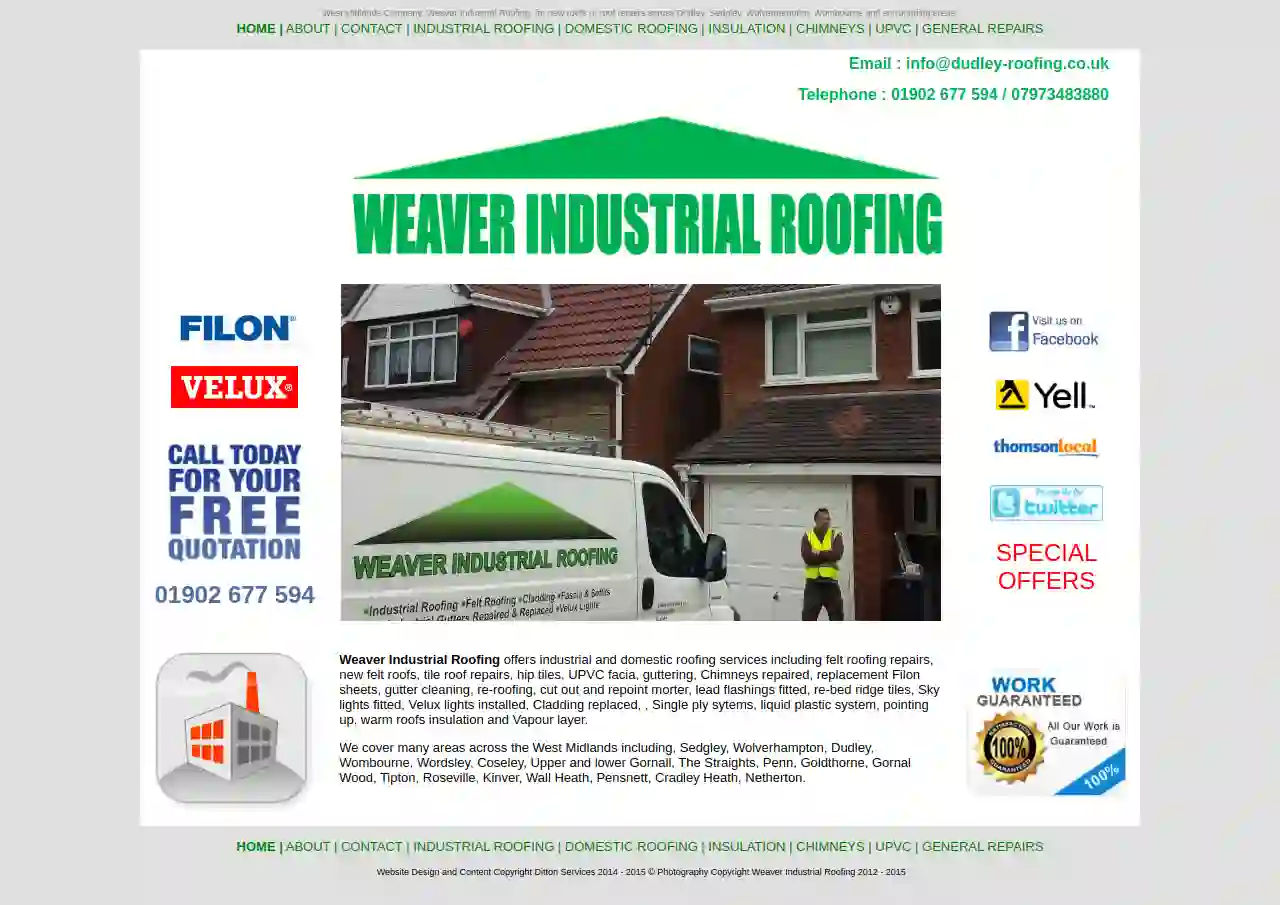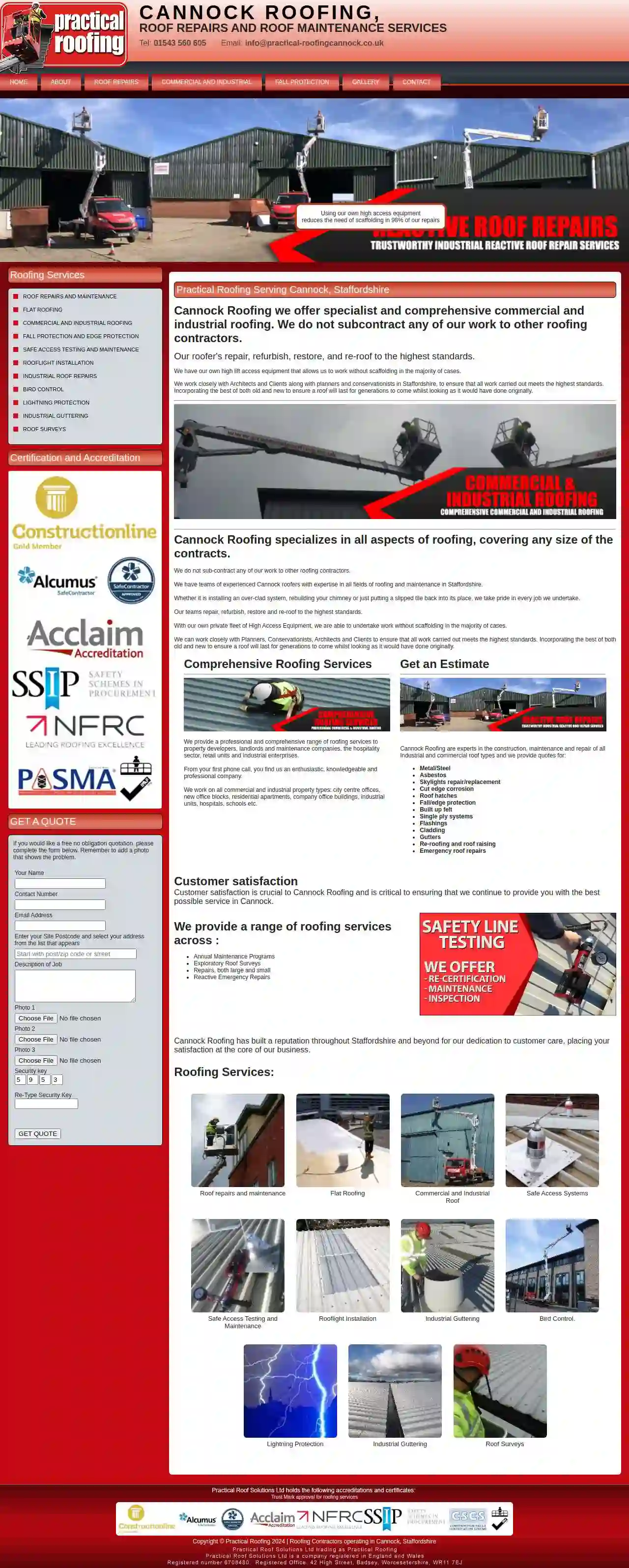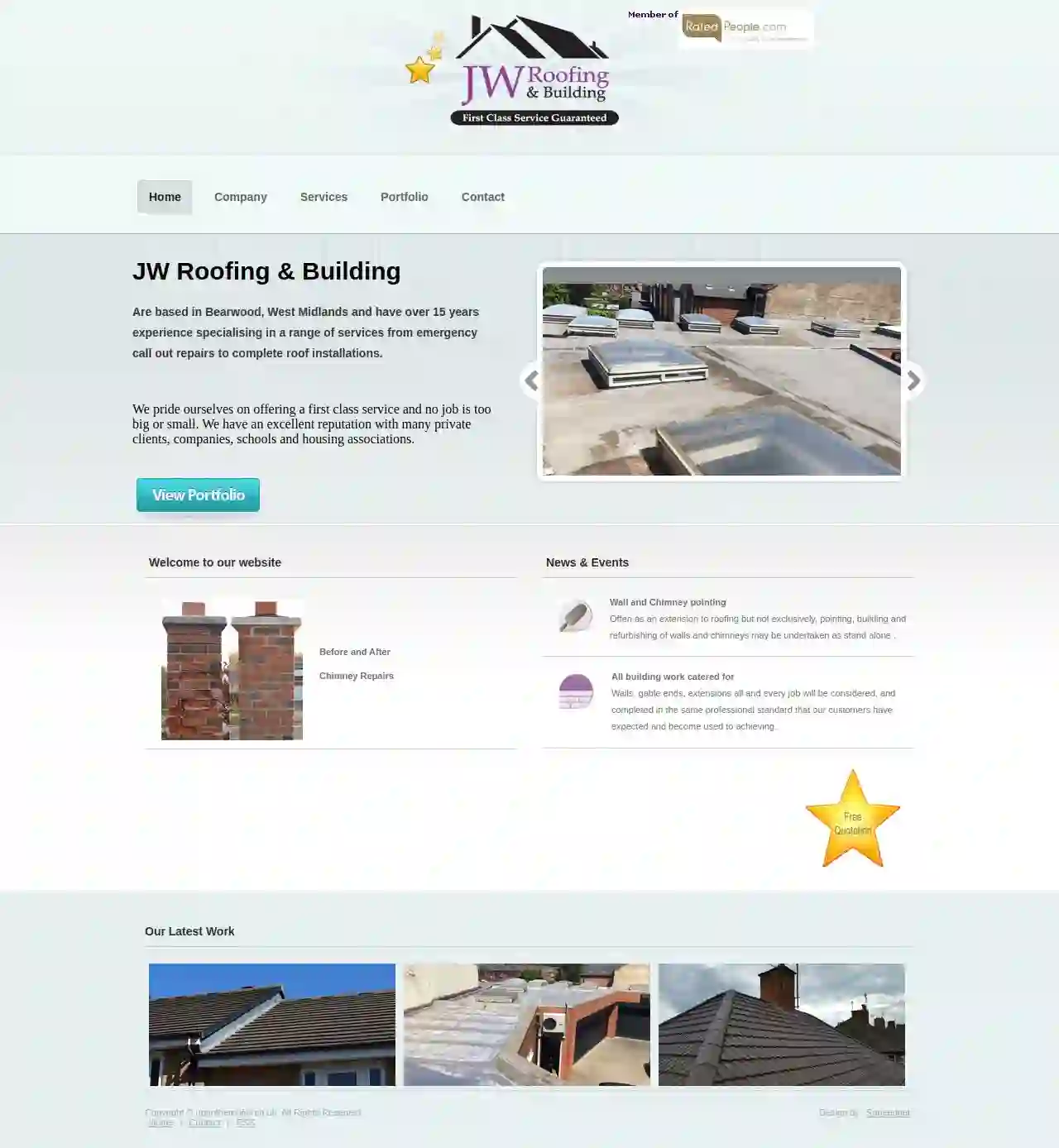Commercial Roofers West Bromwich
Find Commercial Roofing Contractor in West Bromwich
Get up to 3 Commercial Roofers quotes for your project today! Compare profiles, reviews, accreditations, portfolio, etc... and choose the best deal.

J Harris Roofing
Cannock, 47 Rowan Close, WS12 4GD, GBJ Harris Roofing is a renowned family-run business providing professional and reliable roofing services in Cannock and surrounding areas. With a reputation for supplying first-class roofing services at an affordable price, we pledge to treat your property with respect and care. Our team of experienced and highly skilled roofers perform all manner of commercial and domestic roofing works, using only the best materials and techniques. We specialize in new roofs, flat roofs, garage roofs, emergency roof repairs, skylights, velux windows, drone surveys, chimneys, lead work, waterproofing, liquid roofing system, guttering, roof insulation, rubber roofing, green roofs, and cladding, fascias, and soffits. Our commitment to excellent customer service, attention to detail, and pride in our work ensures a pleasant and satisfying experience for every customer.
- Services
- Why Us?
- Accreditations
- Our Team
- Gallery
Get Quote
Weaver Industrial Roofing
51 reviewsWoodsetton, Dudley, 2 Masefield Avenue, GBWeaver Industrial Roofing offers industrial and domestic roofing services including felt roofing repairs, new felt roofs, tile roof repairs, hip tiles, UPVC facia, guttering, Chimneys repaired, replacement Filon sheets, gutter cleaning, re-roofing, cut out and repoint morter, lead flashings fitted, re-bed ridge tiles, Sky lights fitted, Velux lights installed, Cladding replaced, Single ply systems, liquid plastic system, pointing up, warm roofs insulation and Vapour layer. We cover many areas across the West Midlands including, Sedgley, Wolverhampton, Dudley, Wombourne, Wordsley, Coseley, Upper and lower Gornall, The Straights, Penn, Goldthorne, Gornal Wood, Tipton, Roseville, Kinver, Wall Heath, Pensnett, Cradley Heath, Netherton. We pride ourselves on offering you the very best solutions for your roof repairs and new installations. We keep up to date with the latest systems while at the same time can offer authentic solutions for older buildings. One example of this are the old coal tar roofs we have worked on at The Black Country Living Museum. So whether you have a period building or a modern one, large or small, residential or industrial, we can offer the skills and experience to provide you with exactly what you need. We offer free, no obligation quotations, all work is completed professionally, and you can have peace of mind knowing we have full public liability insurance. On top of that all our work is guaranteed.
- Services
- Why Us?
- Our Team
- Gallery
Get Quote
G&M Roofing Services
4.713 reviews36 Hill Street, Burntwood, WS7 3XU, GBG&M Roofing Services is a team of fully-certified professionals dedicated to providing high-quality roofing services to clients across Staffordshire. With years of experience, we tackle projects ranging from small repairs to large-scale installations. Our commitment to customer satisfaction is reflected in our honest, hard-working ethic and our use of traditional methods and top-quality materials. We strive to offer competitive prices without compromising on the quality of our workmanship, ensuring you receive superior roofing solutions without breaking the bank.
- Services
- Why Us?
- Our Team
- Testimonials
- Gallery
Get Quote
James Mathew Roofing Ltd
12 reviewsBillesley, GBWest Midlands Roofing Network is a network of roofing professionals serving Billesley and surrounding areas. We offer a wide range of roofing services for both residential and commercial customers, including roof repairs, flat roofing, guttering, fascias & soffits, and more. Our members are experienced and qualified roofers who are committed to providing high-quality workmanship at competitive prices. We understand that your roof is a vital part of your home or business, and we take pride in providing reliable and durable roofing solutions. Whether you need a small repair or a complete roof replacement, our team can help. Contact us today for a free quote.
- Services
- Why Us?
- Gallery
Get Quote
Seal max roofing
Acocks Green, B13, GBWest Midlands Roofing Network is a network of roofing professionals serving the Acocks Green area. They offer a wide range of roofing services for both residential and commercial properties, including roof repairs, flat roofing, guttering, fascias & soffits, and more. The company emphasizes the importance of a well-built roof and highlights the potential damage that even small leaks can cause. They encourage homeowners to contact them for a free quote if they need any roofing services.
- Services
- Why Us?
- Gallery
Get Quote
National Plastics, Wolverhampton
4.79 reviewsGBNational Plastics is a leading supplier of high-quality plastic building products to both trade and DIY customers. With a wide range of products including bathroom wall panels, kitchen wall panels, fascia and soffit boards, guttering, trims, and more, we offer competitive prices and nationwide coverage with branches conveniently located across the UK. Our team of experts is dedicated to providing exceptional customer service and helping you find the perfect solutions for your building projects.
- Services
- Why Us?
- Accreditations
- Our Team
- Testimonials
- Gallery
Get Quote
Cannock Roofing
51 reviewsCannock, WS11, GBCannock Roofing is a specialist roofing company based in Cannock, Staffordshire, offering a comprehensive range of commercial and industrial roofing services. We pride ourselves on our commitment to quality, customer satisfaction, and providing expert solutions for all your roofing needs. Our team of experienced roofers has a wealth of knowledge and expertise in all aspects of roofing, from repairs and maintenance to new installations and re-roofing projects. We utilize our own high-access equipment, minimizing the need for scaffolding in most cases, ensuring efficient and cost-effective service delivery. At Cannock Roofing, we understand the importance of working closely with clients, architects, planners, and conservationists to ensure that all projects meet the highest standards. We strive to incorporate the best of both traditional and modern techniques, creating durable and aesthetically pleasing roofs that will last for generations. Whether you require a small repair or a large-scale commercial project, Cannock Roofing is your trusted partner for all your roofing needs. Contact us today for a free, no-obligation quote.
- Services
- Why Us?
- Gallery
Get Quote
1st Choice Roofing
59 reviews28 Nayland Croft, Birmingham, B28 0QH, GB1st Choice Roofing & Building Ltd is a well-established company based in Birmingham, West Midlands. We offer both private and commercial roofing and building services to suit all requirements. We provide superior roofing services, including slate roofing, tile roofing, flat roofing, guttering, chimneys, and lead work. Our team is fully trained and qualified, and we offer a 7-day, 24-hour storm-damaged roof repairs and emergency call-out service. We have over 20 years of experience and have completed thousands of successful projects. Our mission is to provide exceptional service and quality workmanship to our customers.
- Services
- Why Us?
- Testimonials
- Gallery
Get Quote
JW Roofing & Building
1.77 reviews80 Abbey Road, Birmingham, B67 5LH, GBJW Roofing & Building is a company based in Bearwood, West Midlands, with over 15 years of experience in a range of roofing services. From emergency call-out repairs to complete roof installations, they pride themselves on offering a first-class service for both domestic and commercial clients. They have a strong reputation with private clients, companies, schools, and housing associations. The company is committed to providing a professional, efficient, and quality service, with a focus on customer satisfaction. They are fully insured and offer a 7-day-a-week call-out service. JW Roofing & Building is an approved contractor for Sandwell Council and a member of Rated People, boasting an expert status due to numerous five-star ratings.
- Services
- Why Us?
- Accreditations
- Our Team
- Testimonials
- Gallery
Get Quote
Bromsgrove Roofing
4.25 reviewsBromsgrove, B60, GBWest Midlands Roofing Network is a network of roofing professionals serving Bromsgrove and surrounding areas. We offer a wide range of roofing services for both domestic and commercial properties, including roof repairs, flat roofing, guttering, fascias & soffits, and more. Our members are experienced and qualified roofers who are committed to providing high-quality workmanship and customer service. We understand that your roof is a vital part of your home or business, and we take pride in providing reliable and durable solutions to protect your investment. Whether you need a small repair or a complete roof replacement, our team can help. Contact us today for a free quote and let us take care of all your roofing needs.
- Services
- Why Us?
- Gallery
Get Quote
Over 12,314+ Roofers onboarded
Our roofing experts operate in West Bromwich and surrounding areas!
Roofyng.co.uk has curated and vetted the Best Roofers in and around West Bromwich. Find a top & reliable business today.
Commercial Roofing FAQs
- Leaks
- Structural damage
- Premature roof deterioration
- Proper Design and Installation: Ensure your roof has a sufficient slope for proper drainage during the design and construction phase.
- Regular Inspections and Maintenance: Inspect the roof regularly for clogged drains or debris buildup.
- Repair Sagging Areas: Address any sagging or low spots on the roof, as they can trap water.
- Tapered Insulation: Consider installing a tapered insulation system to create a gradual slope toward the drains.
- Assessment and Planning: The roofing contractor will assess your roof's condition, take measurements, discuss your needs and budget, and recommend a suitable roofing system.
- Permitting: The contractor will obtain the necessary permits from your local building department, ensuring compliance with building codes.
- Material Delivery: The roofing materials will be delivered to your site.
- Site Preparation: The contractor will prepare the work area, including setting up safety barriers, protecting surrounding property, and ensuring access for equipment.
- Removal of Existing Roof (if applicable): If replacing an existing roof, the old roofing materials will be carefully removed and disposed of properly.
- Roof Deck Preparation: The contractor will inspect and prepare the roof deck, making any necessary repairs or reinforcements to ensure a solid foundation for the new roof.
- Installation of Underlayment: A waterproof underlayment will be installed on the roof deck to provide an additional layer of protection against leaks.
- Installation of Roofing System: The new roofing system will be installed, following the manufacturer's specifications and local building codes.
- Flashing and Edging: Flashing will be installed around chimneys, vents, skylights, and other penetrations to prevent leaks. Edge metal will be installed along the roof's perimeter for a finished look and proper water drainage.
- Inspection and Cleanup: The contractor will conduct a thorough inspection of the completed roof to ensure proper installation and address any potential issues. They will then clean up the work area and remove any debris.
- Minor Leaks
- Loose or Damaged Flashing
- Clogged Drains
- Debris Buildup
- Signs of Wear and Tear
- Regular Inspections: Schedule regular roof inspections, ideally twice a year, to identify potential problems early.
- Timely Repairs: Address any damage or leaks promptly.
- Debris Removal: Keep the roof clear of leaves, branches, and debris.
- Gutter Cleaning: Clean gutters and downspouts regularly.
- Snow Removal: In snowy regions, remove snow buildup to prevent excess weight and ice dams.
- Preventative Maintenance: Consider a roof maintenance plan that includes regular inspections, cleaning, and minor repairs.
How do I prevent ponding water on my commercial roof?
What is the process for a commercial roof installation?
What is a roof maintenance plan, and why is it important?
What are some tips for preventing roof damage on my commercial building?
How do I prevent ponding water on my commercial roof?
- Leaks
- Structural damage
- Premature roof deterioration
- Proper Design and Installation: Ensure your roof has a sufficient slope for proper drainage during the design and construction phase.
- Regular Inspections and Maintenance: Inspect the roof regularly for clogged drains or debris buildup.
- Repair Sagging Areas: Address any sagging or low spots on the roof, as they can trap water.
- Tapered Insulation: Consider installing a tapered insulation system to create a gradual slope toward the drains.
What is the process for a commercial roof installation?
- Assessment and Planning: The roofing contractor will assess your roof's condition, take measurements, discuss your needs and budget, and recommend a suitable roofing system.
- Permitting: The contractor will obtain the necessary permits from your local building department, ensuring compliance with building codes.
- Material Delivery: The roofing materials will be delivered to your site.
- Site Preparation: The contractor will prepare the work area, including setting up safety barriers, protecting surrounding property, and ensuring access for equipment.
- Removal of Existing Roof (if applicable): If replacing an existing roof, the old roofing materials will be carefully removed and disposed of properly.
- Roof Deck Preparation: The contractor will inspect and prepare the roof deck, making any necessary repairs or reinforcements to ensure a solid foundation for the new roof.
- Installation of Underlayment: A waterproof underlayment will be installed on the roof deck to provide an additional layer of protection against leaks.
- Installation of Roofing System: The new roofing system will be installed, following the manufacturer's specifications and local building codes.
- Flashing and Edging: Flashing will be installed around chimneys, vents, skylights, and other penetrations to prevent leaks. Edge metal will be installed along the roof's perimeter for a finished look and proper water drainage.
- Inspection and Cleanup: The contractor will conduct a thorough inspection of the completed roof to ensure proper installation and address any potential issues. They will then clean up the work area and remove any debris.
What is a roof maintenance plan, and why is it important?
- Minor Leaks
- Loose or Damaged Flashing
- Clogged Drains
- Debris Buildup
- Signs of Wear and Tear
What are some tips for preventing roof damage on my commercial building?
- Regular Inspections: Schedule regular roof inspections, ideally twice a year, to identify potential problems early.
- Timely Repairs: Address any damage or leaks promptly.
- Debris Removal: Keep the roof clear of leaves, branches, and debris.
- Gutter Cleaning: Clean gutters and downspouts regularly.
- Snow Removal: In snowy regions, remove snow buildup to prevent excess weight and ice dams.
- Preventative Maintenance: Consider a roof maintenance plan that includes regular inspections, cleaning, and minor repairs.